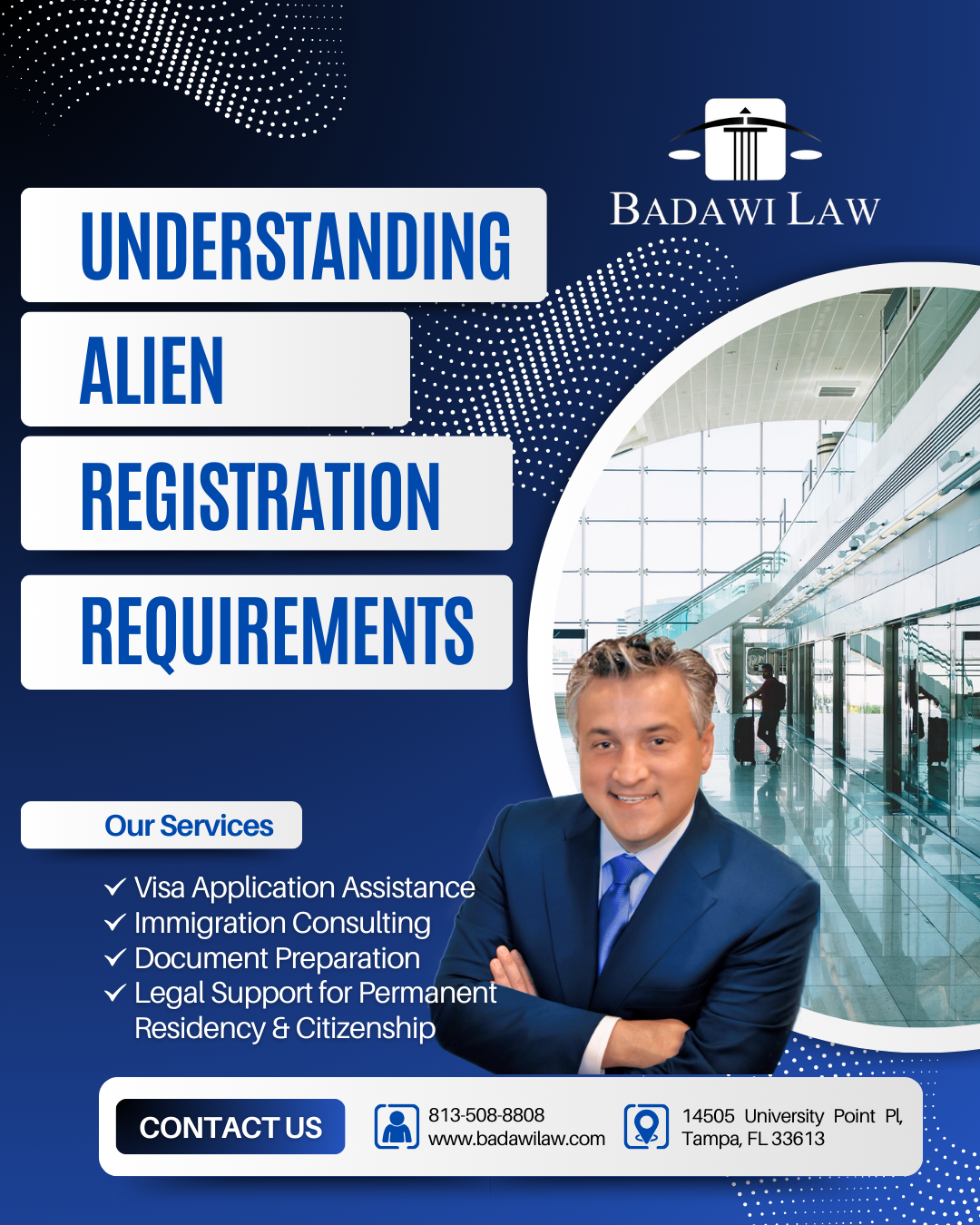
Electronic Device Searches at U.S. Ports of Entry: What You Need to Know
April 8, 2025What is Alien Registration?
Pursuant to a 1940 law, every foreign national who will be in the U.S. for 30 days or more must be
registered and fingerprinted, including those present in the U.S. without admission or parole. They are also required to carry proof of such registration at all times. This law has not been regularly enforced.
However, a new process to provide for registration officially commenced on April 11, 2025.1 This process requires noncitizens who entered the United States (U.S) after April 11, 2025, without inspection and those not lawfully present in the United States to register or be subject to possible arrest for a misdemeanor offense.
Who needs to register?
Many noncitizens, including some who lack legal status, are already considered registered (see “Who is considered to have already registered,” below.) Any other noncitizen who enters the United States (U.S.) and plans to stay for 30 days or longer after April 11, 2025 must register before the expiration of the 30 days.
This mandate includes:
• Canadians who entered the U.S. at land ports of entry and were not issued evidence of registration (e.g. Form I-94).
• Noncitizens who entered the U.S. without inspection and have not otherwise been
encountered by DHS or do not have a registration document. Note that those who applied
for deferred action or Temporary Protected Status (TPS) who were not issued evidence of
registration are included.
• Noncitizen children who turn 14 years old while in the U.S. must register/re-register within 30 days of their 14th birthday. If an LPR is outside of the U.S. when they turn 14, the individual must apply for registration and provide a photograph within 30 days of return. Parents or legal guardians are responsible for their children’s compliance.
What if You Are Undocumented?
If you entered the U.S. without inspection and admission or inspection and parole and have not
registered [not filed a registration from under 8 CFR § 264.1(a)] AND do not have evidence of registration under 8 CFR §264.1(b), you are required to register.
INA §262 mandates registration before the expiration of thirty days after entry to the U.S. Previously, those entering the U.S. without inspection, admission, or parole did not have a designated registration document to use according to DHS. DHS estimates that 2.2 to 3.2 noncitizens in the U.S. may be affected by this rule in the March 12 Federal Register notice
regarding registration.
Registering does not grant legal status and may result in the registrant being detained and placed in removal proceedings. Failure to register may result in civil and criminal penalties.
You should consult with an immigration attorney prior to registering in order to understand the registration process, your rights, and any potential legal risks.
Who is considered to have already registered?
Noncitizens who have already registered include the following:
• Lawful permanent residents;
• People paroled into the U.S. under INA §212(d)(5), even if the period of parole has expired;
• People admitted to the U.S. as nonimmigrants who were issued Form I-94 or I-94W (paper or
electronic), even if the period of admission has expired;
• All people present in the U.S. (except those under the age of fourteen), who were issued immigrant or nonimmigrant visas before their last date of arrival;
• People whom DHS has placed into removal proceedings;
• People who have been granted permission to depart without the institution of deportation proceedings.
• People issued an employment authorization document (I-766) ;
• People admitted to the U.S with a passport admission or parole stamp;
• People who have applied for lawful permanent residence using Forms I-485, I-687, I-691, I-698,
I-700, and provided fingerprints (unless waived), even if the applications were denied; and
• People issued Border Crossing Cards.
Individual Who are Exempt from the Requirement
• U.S. citizens;
• Visa holders who have been already registered and fingerprinted through their application for a
visa;
• A visa holders;
• G visa holders;
• Those in U.S. for less than 30 days;
• American Indians born in Canada who possess at least 50% blood of the American Indian race who are present in the US under the authority of 8 USC §1359.
How and Where to Register
USCIS has established a new form, G-325R, Biometrics Information (Registration). Form G-325R
is submitted online through a myuscis account created via the USCIS website.
https://myaccount.uscis.gov/create-account
Steps to register:
1. Create an online USCIS account at my.uscis.gov.
2. Complete and submit Form G-325R.
3. Attend a biometrics appointment at a USCIS Application Support Center, at which time a
statement is signed under oath reaffirming to the information provided.
4. Receive proof of alien registration document, after completion of background checks.
5. The Proof of Alien Registration document will be available in the USCIS online account.
What does Form G-325R require?
1. Current Legal Name
2. Contact Information
3. Physical Address and Address History for past 5 years
4. Immigration History
5. Biographic Information
6. Police/Criminal Record
7. Family Information
The Form requires certification under penalty of perjury and authorization to release information from any records to determine eligibility.
What documents count as proof of registration?
8 CFR §264.1(b) provides a list of documents serving as “evidence” of registration. USCIS has posted additional documents (see italicized sections below) that serve as such evidence even though the regulation has not been amended to include them. Based on this expanded list, the following documents serve as proof of registration:
• I-94 or I-94W (Arrival-Departure Record paper or electronic) EVEN IF THE ADMISSION PERIOD IS
EXPIRED, which Includes:
People admitted with nonimmigrant visas. [Note that those admitted under the Visa
Waiver Program, I-94W are also included even though not designated under 8 CFR §264.1(b)].
People paroled into the U.S. under INA §212(d) (5), EVEN IF THE PAROLE PERIOD IS EXPIRED.
• I-95, Crewmen’s Landing Permit—Crewmen arriving by vessel or aircraft.
• I-184, Alien Crewman Landing Permit and Identification Card—Crewmen arriving by vessel.
• I-185, Nonresident Alien Canadian Border Crossing Card—Citizens of Canada or British
subjects residing in Canada.
• I-186, Nonresident Alien Mexican Border Crossing Card—Citizens of Mexico residing in Mexico.
• I-221, Order to Show Cause and Notice of Hearing—People against whom deportation
proceedings are being instituted.
• I-221S, Order to Show Cause, Notice of Hearing, and Warrant for Arrest of Alien—People against
whom deportation proceedings are being instituted.
• I-551, Permanent Resident Card—Lawful permanent residents of the United States.
• I-766, Employment Authorization Document— People with work permits.
• I-862, Notice to Appear—People against whom removal proceedings are being instituted.
• I-863, Notice of Referral to Immigration Judge— People against whom removal proceedings are
being instituted.
• A valid, unexpired nonimmigrant DHS admission or parole stamp in a foreign passport.
• If you have applied for lawful permanent residence using Forms I-485, I-687, I-691, I-698, I-700, and provided fingerprints (unless waived), even if the applications were denied.
More information may be found at USCIS and 8 CFR §264.1: https://www.uscis.gov/alienregistration
Do I have to register after each entry to the U.S.?
If you have a nonimmigrant or immigrant visa, you are registered. In addition, even an expired I-94 or I-94W is proof of registration. Under 8 CFR §235.1(h), I-94s issued at the land border are by default valid for multiple entries while those issued at an airport or seaport are by default issued for a single admission, unless otherwise specified. USCIS indicates on its website that the obligation is tied to your “current stay of 30 days or more.” It is critical to consult with
competent legal counsel to address these points, and we expect more clarification to develop as time progresses. For example, right now it is challenging to complete the G-325R due a limitation on options for types of entry.
What Happens If You Don’t Register or Carry Proof?
Noncitizens who are 18 years or older must carry proof at all times of their registration. A willful failure to do so could result in a misdemeanor offense punishable by a fine of up to $5000, or imprisonment of not more than 30 days, or both. There is a separate criminal offense and removal ground for registering using false documents.
If you do not register and later apply for an mmigration benefit or visa, the government might
deny the benefit or visa for failing to register.
Everyone living in the U.S. still has basic rights under the Constitution. You have the right to remain silent when questioned. You have the right to speak to a lawyer, if arrested. See AILA’s Know Your Rights
Flyer on being stopped in public. https://www.aila.org/library/know-your-rights-if-ice-stops-you-inpublic
Change of Address Requirement
If you change your residence, you must notify USCIS of your new address within 10 days. Failure to do so can result in a fine of up to $5000 and/or up to 30 days imprisonment and may result in removal, unless the failure to timely notify is reasonably excusable or was not willful.
https://www.uscis.gov/addresschange
It is essential that individuals who may be affected by this policy consult with a competent and
reputable immigration lawyer, if at all possible, to receive the most appropriate advice for their
circumstances. If you do not have an immigration attorney, you can find one at www.ailalawyer.org.


